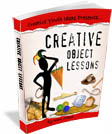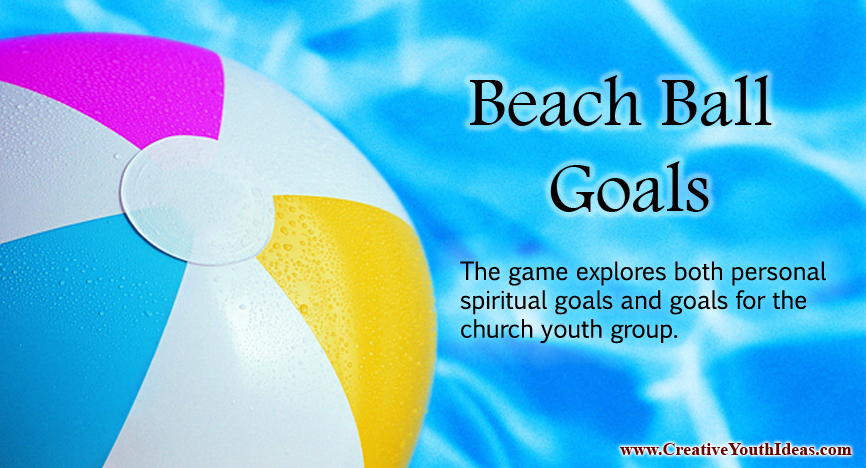Beach balls are great for the beach, but you don’t need to be at the beach to play these games. The final game explores both personal spiritual goals and goals for the church youth group.
PLEASE SHARE THIS IDEA ON FACEBOOK
Games Using Beach Balls
- Beach Ball Balloon Basketball – Use laundry baskets or large waste baskets as the “goal”. Divide into teams and play like regular basketball. Balloons must stay in the container for points to be scored.
- Beach Ball Dodge ball – Use one or more beach balls to play a game of dodge ball. Whoever is hit is out. The Goal of this game is to be the last person standing.
- Beach Ball Icebreaker – A beach ball with icebreaker questions written on the ball. In a large circle, someone tosses the ball to another person to catch. The person that catches the ball calls out the question closest to their right thumb. The youth then answers the question and throws the ball to another participant. Continue until everyone has had a chance to answer a question.
- Beach Ball Relay – Create a relay course with start and finish lines indicated by tape or chalk. Players must remove their shoes and then stand at the starting line in teams. One member of each team must wear a pair of sunglasses and hold a beach ball between his/her knees. Team members race to the goal line and back without dropping the beach ball. The players then pass both items to the next team member, and the team to finish the relay first wins the game.
- Dragon Dodgeball – Have the entire group make a circle. Pick four to five people for each team. The first team goes into the center of the circle and forms a line by attaching their hands to the waist of the person in front of them. The people who make up the circle throw the beach ball at the “dragon”, trying to hit the last person below the waist. Once hit, the last person returns to the outside circle and players continue to hit the new person at the end of the dragon until there in only one person left and they too are hit. A new team then goes into the middle. Time each team. The Goal is to see which team can last the longest.
- Hunter Ball – A hunter tries to shoot other players by tossing a beach ball at them. The player who is shot is out if hit. If the player catches it or if the beach ball hits the ground first there is no kill. He may then throw the ball wherever he wishes. Goal is to be the last person standing.
- Moonball – Teams compete with the goal to hit a beach ball up in the air as many times as possible before it hits the ground with the following rule: a player may not hit the ball twice in succession. Count 1 point for each hit. To make it more difficult you can add additional rules: 1) a group’s score does not count until everyone has hit the ball once 2) Players can only hit the ball with their hands or head and 3) players cannot “punch” the ball.
- Rabbit and hunter – A player (rabbit) is in the middle of the circle. The hunter on the outside of the player must try to hit the rabbit with a ball. The time is recorded how long it takes before a rabbit is hit. The goal is to be the rabbit who held out the longest.
- Scatterball – In this version of dodgeball no one ever really gets out. Throw the ball in the air, and someone grabs it. They have 5 seconds and can take 3 steps before throwing the ball. If you get hit, you sit down. If you are sitting down and a ball comes near you, you can pick it up and throw it at someone standing up. If they get hit, they sit down, and you are back in.
- Speed Ball – Divide the group into 2 equal circles. Give each group 3 beach balls. The object is to pass the balls around the circle at the highest speed possible. Whenever someone drops a ball, they leave the circle. At the allotted time, the team with the most players left wins.
- Steal the Bacon – Divide the youth in half and line them up on either side of the room. Have them number themselves off starting at one and going up. Each side will have one of each number. Put the beach ball in the middle. Call out a number, for instance, 3. The number three from team one and the number three from team 2 go toward the beach ball. Points are awarded in 3 ways. They can either pick up the beach ball and run it back to their team for one point. They can tag the other person as they try to run it back, one point. If they pick it up and drop the beach ball, one point goes to the other team.
- Tunnel ball – The team makes a tunnel with their legs spread apart. A beach ball must be rolled through the tunnel. The last player collects the beach ball and runs to the front to roll the ball through the tunnel again. You can either have 3-4 rounds where the fastest team wins or the teams must complete a certain distance. The first group to reach the goal line has won.
- Ultimate Ball – divide the youth group into two teams. Find something you can use on either side of your room for a goal. This can be basketball goals, chairs, a spot on the walls, or the walls themselves. The goal for each team is to pass the ball to their team mates and work the ball down the room until someone can throw it and hit the goal. Play just like ultimate frisbee. A player cannot dribble, or run with the ball, they must pass it to their team mates. If the ball hits the ground, the other team takes possession and try for their goal.
———————————————
If you are limited on time, just use this game…
———————————————
Life-Size Foosball – This game can be played in any open space and some indication or marking of a goal at each end. You can use stakes and string to mark any field. Indoors you can use masking tape to tape the string to the floor. If you are at the beach, just draw your lines in the sand!
Played like foosball (also known as table soccer) this game is a less strenuous form of soccer that almost anyone can play.
Preparation
If the field is not marked off into lines do so in such a way that there is one goalie for each team and the other players are evenly distributed across the field. Players must stay within their marked off boundary. The more narrow the field, the less they will have to run from side to side. If you have a small space, you can even play sitting down.
How to Play
- Divide the group into two teams.
- Allocate the area between lines on the field so that the players are evenly distributed across the field with 2 or three players inside each area. Alternate areas between teams.
- All of the members of one team face toward the opposing team’s goal. Rows can be very close or several feet apart, depending on the size of the chosen field area.
- Players may move freely to the right or to the left, but they may not move forward or backward at any time. Players must remain inside their designated area between the two lines.
- Play and score the game just like regular foosball. A point is scored for each time the beach ball goes over the opposing team’s goal-line or hits the opposite wall.
- If the beach ball is kicked out of bounds, it is tossed back into the game by any player.
- A coin toss decides the 1st serve.
- The goalie on the serving team tosses the ball into play with his hands.
- Other players try to kick the ball into the opponents goal.
- If a player steps out of his boundary box, the ball goes to the opposing team.
- If a goal is scored, the team last scored upon gets the serve.
- The opposing team also gets to serve after a ball is out of play, or after a neutral dead ball.
- You can decide whether the goalie can use hands or not to block goals. Use of hands makes it much easier to block.
- The first team to score 10 goals wins.
TAKE IT TO THE NEXT LEVEL
MAKE IT SPIRITUAL
What is our goal as a church (or youth group / cell group)
In our group, each of us has areas of responsibility. Sometimes these areas are shared. Our area of responsibility will be based on God’s calling, his gifts, and even our personal interests. Whenever something falls into our area, we are responsible for handling it.
What is the result of someone not handling their area in this game? How does it affect others on the team? How is this similar or different to the body of Christ?
In our own group, do we ever step into other people’s areas of responsibility? Why do we do so? What are some of the possible consequences of stepping into other people’s areas of responsibility?
(They don’t have the opportunities to develop their own gifts and skills for ministry, we may neglect our own area, we burn out, we lose focus)
MAKE IT PRACTICAL
What are some of the areas we need to cover in order to achieve our goal or goals as a group?
MAKE IT PERSONAL
What do you see as an area you can take responsibility for in our group? Why do you see yourself in this area? How will serving in this area help you to grow and develop your own gifts?
Action Point
Find your area and commit to covering that so that as a group we can achieve our goals!
SCRIPTURE
I Corinthians 12 – The Body of Christ
PLEASE SHARE THIS IDEA ON FACEBOOK
 MORE IDEAS? See “Creative Object Lessons”
MORE IDEAS? See “Creative Object Lessons”
200 page e-book that explains everything you need to know when planning your very own object lessons. It contains 90 fully developed object lesson ideas and another 200 object lesson starter ideas based on Biblical idioms and Names / Descriptions of God.
![]()


